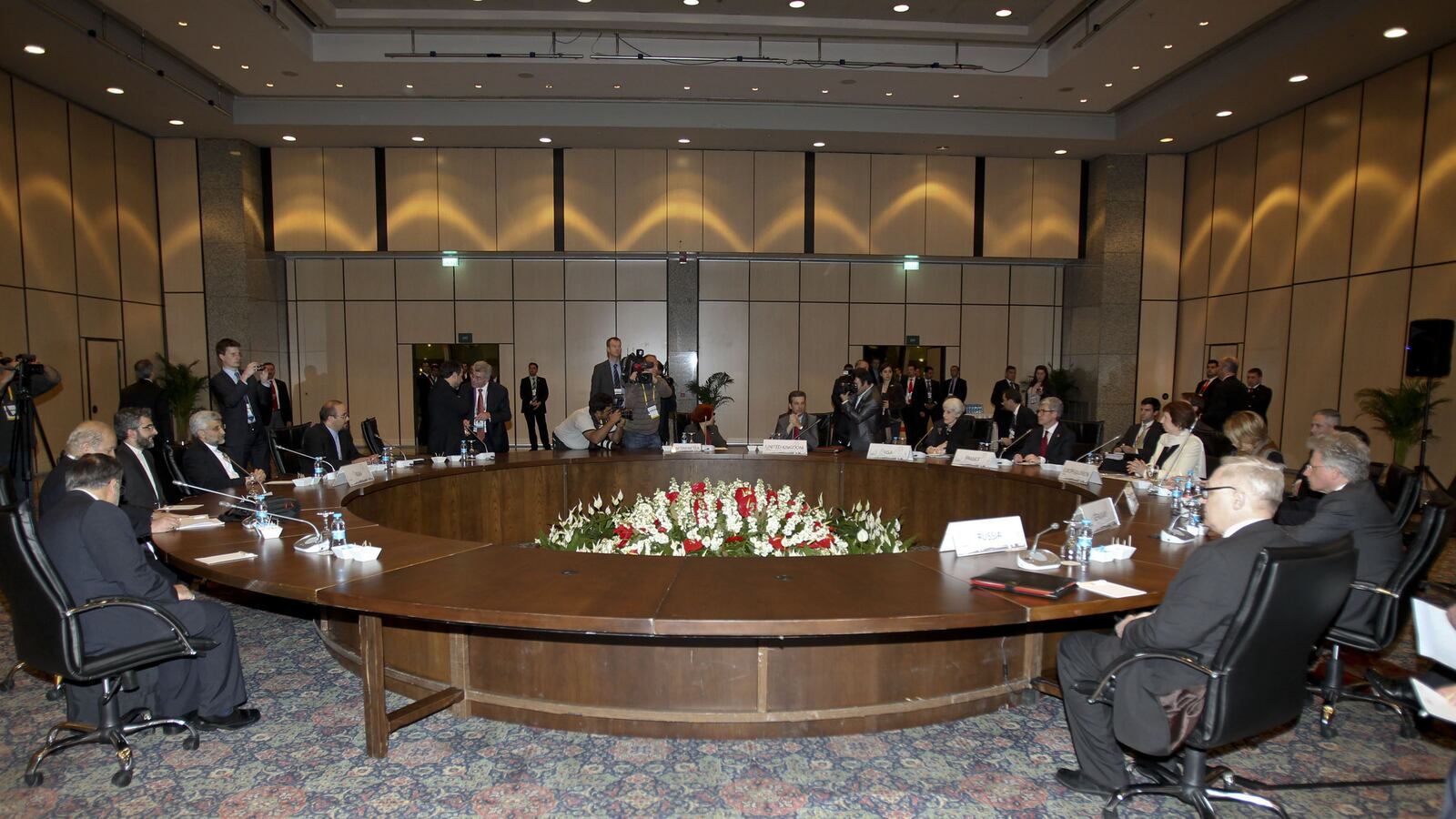At a recent briefing in Washington, a prominent scholar observed that the crisis over Iran’s nuclear program is similar to the Israeli-Palestinian conflict, in that the contours of a negotiated solution are well-known—what is lacking is the political will and leadership to get there.
With new Iran talks underway, this is an important insight. And it’s a corollary to something that my friend and colleague, Jerusalem expert Daniel Seidemann, often says about solving the Israeli-Palestinian conflict: The challenge is to bridge between the politically impossible and the historically inevitable.

It is indeed widely known what a conflict-ending Israeli-Palestinian agreement will require: A two-state solution along the lines that were the unwritten subtext of the Oslo Accords, informally delineated in the Clinton parameters, and spelled out in the Geneva Initiative and in the Arab Peace Initiative. Much of the work has already been done in official and informal (Track II) negotiations to flesh out the details.
It is also widely recognized that there are people on all sides—Israeli, Palestinian, and American—who oppose such an agreement. Such people oppose compromise, whether for nationalistic, religious, political, or ideological reasons. It has long been clear that the true obstacle to achieving Israeli-Palestinian peace is not the issues themselves but insufficient political will and leadership to overrule these opponents of peace. The outlines of a crisis-ending agreement with Iran are likewise clear: Iran will cap uranium enrichment at below 5%, export all stocks of uranium enriched above this level, limit enrichment to one or two sites, and fully open all aspects of its nuclear program to IAEA inspectors, such that the IAEA can verify that its program is entirely civilian. In return, the sanctions siege currently imposed in Iran will end, and normalization of relations between Iran and the international community will begin. Experts and negotiators on all sides have long understood that if there is going to be any deal, it will be along these lines. Such a deal was the basis of previous talks and it was the framework for the 2010 Turkey-Brazil deal—a deal which was rejected by the United States more because of timing than content. Regrettably, many oppose such an agreement, including some Iranian hardliners who appear to think that any compromise is a trap, who oppose normalization with the West, or who believe that war will be a net benefit to their regime. Likewise, there are American and Israeli hardliners who seem determined to block this kind of diplomatic solution, often by arguing against any agreement that doesn't compel Iran to cease all enrichment activity (a non-starter), or against any agreement that fails to address not only Iran's nuclear program but issues like democracy, human rights, and terrorism. It is hard to avoid the conclusion that these critics of a potential agreement actually want war—not to deal with Iran’s nuclear program, but in the hopes that war will lead to regime change. Like the Israeli-Palestinian issue, the biggest obstacle to reaching an agreement to address Iran’s nuclear program is the absence of the necessary political will and leadership to overcome these reckless forces of opposition. There are three additional parallels between the Israeli-Palestinian conflict and the Iran crisis. First, the status quo in both cases is quite obviously unstable, untenable, and dangerous. Second, failure in either case to achieve a negotiated solution, or at least serious progress toward one, will guarantee that things get worse. In the Israeli-Palestinian context, we are facing the imminent loss of the two-state solution, which will usher in more conflict and insecurity. In the Iran context, we are facing the threat of imminent war—a war that won’t resolve the nuclear issue and will have catastrophic consequences. And third, those people who oppose a viable negotiated agreement to the Israeli-Palestinian conflict are, for the most part—and perhaps unsurprisingly—the same people who oppose such an agreement to the Iran crisis. This is true with respect to opponents in Iran, the West Bank, and Gaza, but it is most glaringly true with respect to Israel, where Israeli Prime Minister Netanyahu appears to be equally committed to avoiding an Israeli-Palestinian peace agreement and undermining efforts to achieve a diplomatic compromise with Iran; and the United States, where the same groups, most notably AIPAC, lead efforts to shape U.S. policy on both Israel-Palestine and Iran. This last parallel underscores the fact that there will always be people who believe that total victory over the enemy—be they the Palestinians, the Iranians, or the Israelis—is the objective. And there will always be people who believe that time and might—political, military, or divine—are on their side. Such people will try to block any compromise, at any cost. They can’t be allowed to succeed, either on Israel-Palestine or on Iran. The stakes are too high. The Rolling Stones famously sang, “You can’t always get what you want / But if you try sometimes well you might find / You get what you need.” Likewise in negotiations to resolve complex conflicts, the best outcome is agreements in which neither side gets everything it wants, but both sides get what they need. Such agreements will inevitably be opposed by absolutists and ideologues, but they can produce results that the majority of people on all sides can recognize leaves them better off than before. Such agreements for both the Israeli-Palestinian conflict and the crisis over the Iran nuclear program are available, even if it is difficult to see a path to achieving them. Which brings us back to the challenge of bridging between the politically impossible and the historically inevitable. Resolute political will and courageous leadership can bridge this gap with respect to both Israel-Palestine and Iran. And they are the only things that can prevent further pointless, unnecessary conflict and war.




